Welcome to today’s edition of ShentonSTAGE Daily.
The health of the theatre depends, at least partly, on the health of the critical response that is offered to it. Of course the theatre CAN do without critics in a way that critics can’t do without theatre — theatre exists whether or not it is reviewed, whereas critics have nothing to write about without it — but it’s also my belief that the theatre NEEDS critics, or at least the right kind of critics, to hold it to account: to champion it, for sure, but also to CRITICISE where necessary.
Unbridled enthusiasm — of the sort where every single show is the best thing ever seen, since the last thing seen — soon becomes utterly meaningless, as we’ve seen in some of the more pointless members of the blogging community. But good critics guide and inform readers — their primary responsibility — but also guide and form the direction that theatre itself takes.
It’s why we need good critics more than ever. At a time when theatre is facing numerous challenges to reach audiences, not least the rising costs of providing it that are reflected in the prices it must charge, theatre and those audiences need all the help they can get. So the more the merrier, perhaps.
But I’d say we need fewer and better. I recently posted a column here in which I rated the principal critics currently working in the old ‘legacy’ press — the print newsprint and magazine titles that also nowadays have an online presence, which are still the first port of call for reviews when a show opens.
Here are the critics I awarded five stars to:
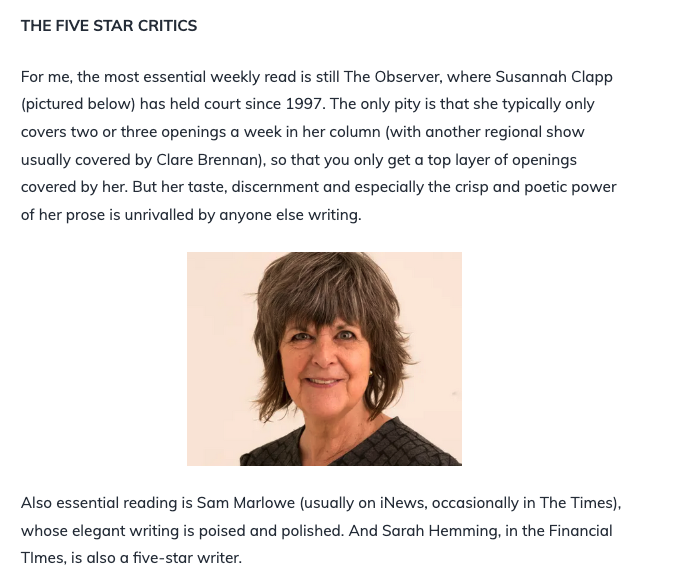
That piece, written in mid-August, is already out-of-date: Marlowe now has a new full-time job as reviews editor of THE STAGE, whose theatre coverage her considered and considerable presence is already transforming (her review of EUREKA DAY at the Old Vic is the most perceptive I’ve yet read on that production).
It was my honest reflection of what I thought of the current state of play. Of course, some of the critics I wrote about took umbrage — as did some of those NOT mentioned in the piece, as you can see in this sample thread on twitter. I make no apology for causing offence in this case: I’ve always said that as critics give it, they need to be able to take it, too. And I’m happy to take it from them, in turn.
The truth is that criticism feels like it is in terminal decline. When I first joined the critical ranks, many of the big beasts of criticism were still writing: Michael Billington in The Guardian, Charles Spencer in the Daily Telegraph, Benedict Nightingale in The Times, Paul Taylor in The Independent. John Peter in the Sunday Times, Michael Coveney in the Daily Mail, Alistair Macaulay in the Financial Times, Georgina Brown in the Mail on Sunday, Susannah Clapp in The Observer and Jane Edwardes in Time Out. (Yes, it was heavily skewed male, white and then already middle-aged; changes needed to happen, and to an extent they did, but these critics had AUTHORITY. They earned it in the quality of their criticism, and their years of service).
Only Susannah Clapp is still in post amongst that list above. Sarah Hemming, who replaced Macaulay on the FT (alongside Ian Shutttleworth, now retired to Berlin), is also still writing there. But we’ve seen a complete change of the critical guard everywhere else in the last ten to fifteen years.
And the new lot, with a few exceptions, are mostly unexceptional. Yes, they’re fighting a harder battle to be heard, amidst the din and clatter of the internet. And theatres and publicists have variously sought to disempower them, too, by allowing in so many other voices.
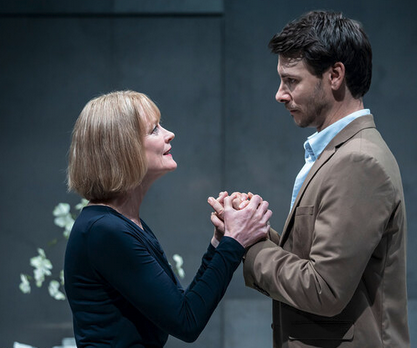
Two shows I saw last week illustrate the result neatly of critics floundering to make an impression. On one hand, I returned to see Christopher Shinn’s whip-smart THE NARCISSIST, premiered in Chichester last month and which I wrote about here, at the final performance of its run on Saturday (pictured above, Claire Skinner and Harry Lloyd).
It received two more overwhelmingly favourable reviews, from the estimable Mark Lawson for The Guardian (easily the best of the many voices now filing reviews for it), and of course from Susannah Clapp for The Observer, who calls it “a zinging evening”. Other reviews were a more guarded three-stars in The Times, Daily Telegraph and The Stage. Each of them are strikingly well-written, but the galvanising passion that would make audiences rush to book tickets or other theatres rush to programme the play is lacking. Instead, it was met, critically speaking, with cool dispassion — and that doesn’t sell tickets.
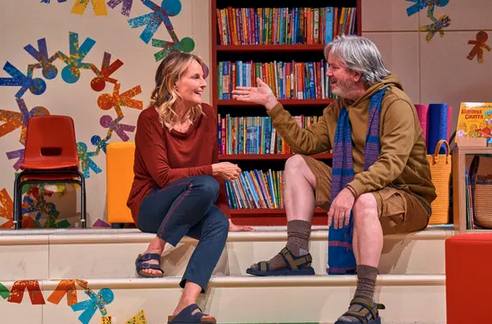
On the other hand, the Old Vic’s UK premiere for another American playwright Jonathan Spector’s EUREKA DAY (Helen Hunt and Mark McKinney are pictured above) hits a sweet spot of seeming prescience: even though premiered Off-Broadway in 2019, pre-COVID, its story of a primary school where an outbreak of mumps has shut it down, and the parents divide into camps as to whether it should only be re-opened to those children who’ve been vaccinated has of course special resonance in the wake of COVID. This is a play far more calculated to arouse strong emotions than THE NARCISSIST, and some of the critics duly oblige.
In the Daily Telegraph, Dominic Cavendish rejoices in its shooting down of the tropes of ‘woke’:
“Eureka! Have they got it? Is our theatre finally awake to the ludicrous – and also pernicious – side of woke? To me, it feels like a turning-point that the Old Vic has ushered on to its stage Eureka Day, Jonathan Spector’s very sharp, very droll satire on the duplicities and deficiencies of progressive group-think – first seen in the States in 2017. Having last year forced Terry Gilliam’s producdtion of Into the Woods out, on the say-so of those concerned about keeping the building a ‘safe space’, it’s worth a loud cheer to see the venue recover its wits via a demolition-job of phoney inclusivity, where diversity is championed but free-thinking, even rationality, proves problematic.”
In The Guardian, Arifa Akbar adopts a more ambivalent tone:
“While the play as a whole develops from its caricatured first half into an engrossing and textured show, it has the potential to go much further, dramatically and discursively, but keeps that potential unspent.”
The potential of critics to rise above the noise of the internet is currently also mostly being unspent, too, more’s the pity. They will drift into obsolence if they’re not careful.
WELCOME NOTES OF PERFECTION
In the 43 years since I started going to performance at the London Palladium regularly, I’ve seen many, many great artists and many great performances. One of the most indelible still remains George Hearn, reprising his Broadway role in the London transfer of the musical LA CAGE AUX FOLLES, in 1986.
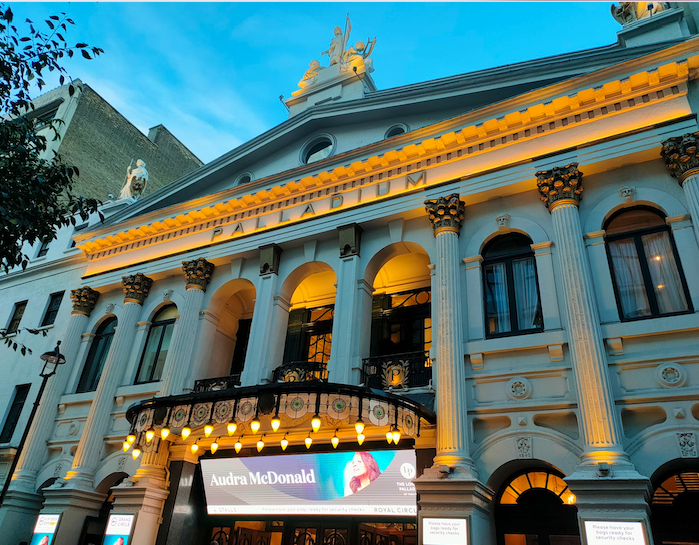
Audra McDonald appropriated his big Act One closer, “I Am What I Am”, to open her London Palladium debut last night, and made into as defiant and definitive a statement of telling us that she’s here and though she may not be queer, she’s not going to make any excuses or compromises for who she actually is, either.
I’ve seen every one of her Broadway performances, bar a Shakespeare at Lincoln Center, in plays as well as musicals (she returns there this winter in Adrienne Kennedy’s OHIO STATE MURDERS, opening at the newly-renamed James Earl Jones Theatre, formerly the Cort, from November 11, prior to an official opening December 8). I’ve also seen in concert, everywhere from Carnegie Hall to the Royal Albert Hall (in a Prom performance of WONDERFUL TOWN), and the Donmar Warehouse to tiny rooms in Cutuit and Provincetown (both on Cape Cod).
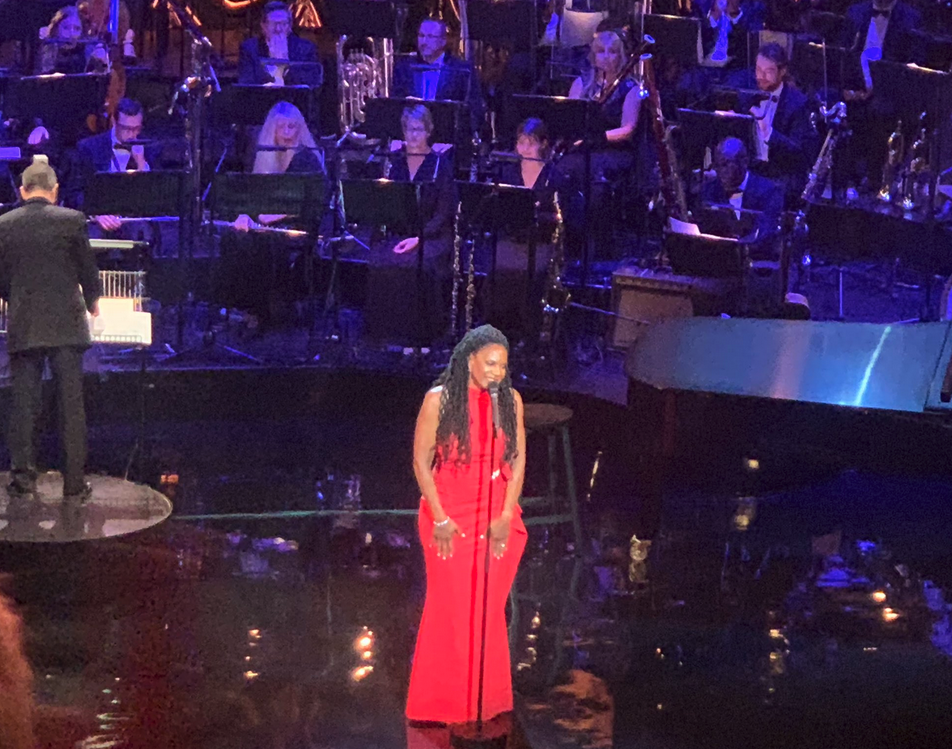
But I’ve never seen her in such blazingly confident, mellow yet spectacular form as she was last night backed by the 40-piece London Musical Theatre Orchestra under her regular MD Andy Einhorn.
Now 52, and a mother who has raised four children (her own are Zoe, now in her twenties and in college, and Sally James who is just 5; she also has two step-children with husband Will Swenson), she radiates contentment but also vigorous concern for the state of our planet.
None of this, of course, is forced; she has an effortless ease, both in her fluid and utterly natural conversation with the audience, and of course in her stunning singing. Last night she cited her mentor Barbara Cook for urging her to embrace imperfections and mistakes; not that there are any (beyond sometimes having to take cues from her MD as to what the next song is), but she is utterly at home onstage.
She is both personal and personable; her voice a shimmering instrument of pure vocal pleasure. When her daughter Zoe was 3, she told her mom that her singing made her ears hurt; last night, ours purred with happiness.
SEE YOU ON THURSDAY
I’ll be back here on Thursday. If you can’t wait that long, I may also be found on Twitter here: https://twitter.com/ShentonStage/ (though not as regularly on weekends)
